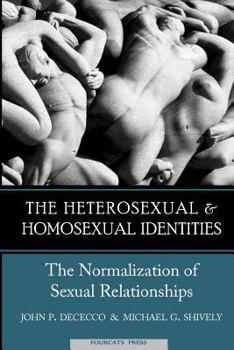The Heterosexual and Homosexual Identities: The Normalization of Sexual Relationships
From The Homosexual and Heterosexual Identities: "The awesome inevitability of biological, psychological, or sociocultural forces has placed the control and responsibility of relationships well beyond the grasp of the partners involved in them. Indeed, the discourse on sexual identity has progressed as a moral pronouncement (no matter how intricately couched in the languages of "science") that narrowly circumscribes the exercise of sexual choice. Because the social sciences have scarcely explored possibilities for understanding sexual relationships from the perspective of moral choice rather than of moral obligation, three vast domains of action and agency in sexual relationships remain uncharted and largely neglected. First, the actual structure of relationships, which may be determined from the mentality and practices of the individuals who engage in them, no matter how accurately or inaccurately this reflects prevailing morality or convention. Second, the prerogative of the partners within relationships to make decisions about the nature, meaning, definition, and character of their sexual behavior. And, finally, the way in which rules governing relationships and establishing their boundaries may be envisioned as products of the relationships themselves rather than of pre-established moral, biological, cultural, or psychosocial parameters. The structural similarities of heterosexual and homosexual relationships go unrecognized when it is assumed that different sexual identities require dissimilar structures. Approaching relationships as if they were governed by lawful forces, in the manner in which physical and biological phenomena are organized, the social scientist is blinded to the boundless ingenuity individuals exercise in forming, maintaining, and ending sexual relationships. In that context, concern with sexual identity appears to be a narrow preoccupation."
Related Subjects
Psychology




